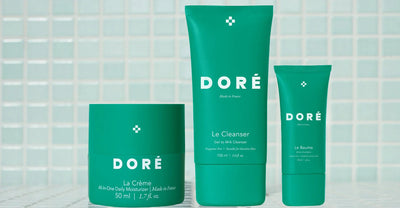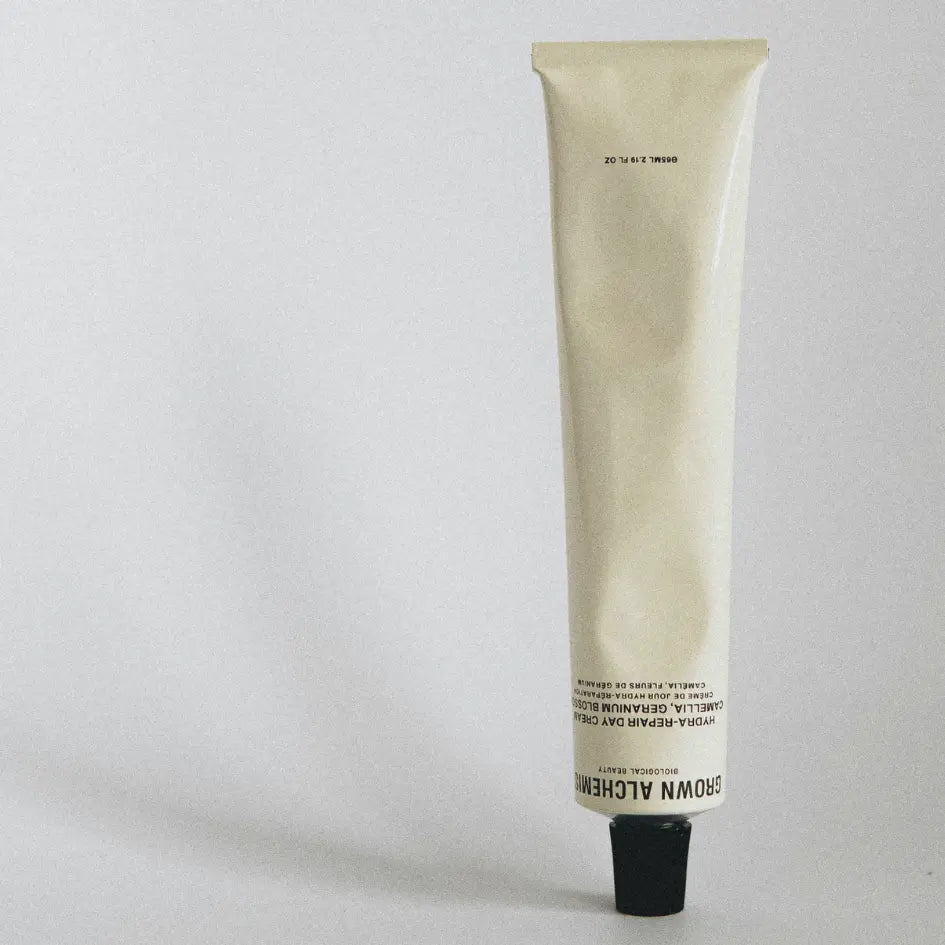Dore
Our ratings are based on a scale from 1 (Avoid) to 5 (Top Choice).
See how we rate.
The Shifting Gaia rating evaluates brands based on sustainable practices, ingredients and materials, and social responsibility, among others. Below are a few factors influencing this brand's score:
overview
about
Doré is a French skincare brand offering a minimal line of cleansers, moisturizers, and balms. Highlights
• Recyclable PCR packaging
• Plastic Neutral certified
• Plant-based biodegradable formulas
• EWG Verified, toxin-free
• Cruelty-free & vegan
sustainability
details:
Packaging
All primary packaging is recyclable, with full recycling instructions provided on each product page. The brand favors post-consumer recycled (PCR) plastics in its packaging: for example, Le Cleanser and Le Baume tubes incorporate 50% PCR polypropylene, and La Micellaire's bottle uses 30% PCR plastic. The company has avoided secondary packaging wherever possible as a sustainability choice.
Doré further offsets its packaging impact by being Certified Plastic Neutral via rePurpose Global, meaning it funds the removal of as much plastic waste from the environment as it produces. The only gaps are a lack of public detail on packaging adhesives/inks or compostable materials, and current use of plastic components (albeit recycled).
Ingredient Sustainability
Doré consciously avoids petrochemical ingredients such as silicones or petrolatum; as the brand notes, none of its 1,600+ banned “questionable” ingredients are present (no parabens, silicones, sulfates, etc.). The formulations use eco-friendlier alternatives (e.g. plant-derived emulsifiers and gentle preservatives) that are more readily biodegradable.
Many ingredients are obtained from renewable crops around the world (aloe from Mexico, rose water from Morocco, algae from Brittany, etc.), and Doré discloses these origins on its site.
The brand does highlight that La Crème's natural vitamin E is sourced from coconut and palm kernel oil. This does imply some use of palm-derived material; Doré doesn't state RSPO certification for palm sourcing.
Overall, however, Doré's ingredients skew toward biodegradable, plant-based substances. The end-of-life impact of these formulas is relatively low. Every product in the launch range met the stringent Environmental Working Group criteria for health and transparency, achieving EWG Verified™ status.
Energy Use and Footprint
On the positive side, Doré partnered with Bluebird Climate to analyze the carbon impact of its product manufacturing and packaging. However, operational sustainability disclosures beyond packaging are sparse. There is no published information about Doré's use of renewable energy in manufacturing or offices, nor data on its direct emissions or targets for reductions. The brand's production in France means it benefits from relatively cleaner energy grids (France's electricity has a low-carbon mix) and strict environmental standards, but Doré itself hasn't provided details on factory energy efficiency or green sourcing.
Waste Management
Beyond packaging waste, there is little publicly available information on how Doré mitigates waste in its production and day-to-day operations. The brand's sustainability communications focus heavily on packaging and ingredients, while aspects like manufacturing waste, water use, or facility waste diversion are not addressed.
Business Model
Doré's business model is deliberately crafted to promote mindful consumption and discourage the excesses common in the beauty industry. From launch, the brand embraced a “less is more” philosophy. The brand's has demonstrated some adherence to slow beauty principles: limited launches, multi-use products, planned refills, and educational content.
non-toxic
details:
Doré excels in formulating safe, non-toxic products, as evidenced by its across-the-board EWG VERIFIED™ status. The brand consciously omits a wide array of potentially harmful or irritating chemicals. Notably, Doré products contain no parabens, phthalates, sulfates, PEGs, ethanolamines, formaldehyde-releasing preservatives, synthetic dyes, or added fragrance. Instead, formulas rely on safer preservatives and gentle surfactants, and are fragrance-free to minimize allergy risks.
In addition to formulating without known toxins, Doré provides full transparency about its ingredients. Third-party validations further underscore Doré's non-toxic stance. Besides EWG's verification, Doré's Le Baume earned the National Eczema Association's Seal of Acceptance, certifying it as suitable for eczema-prone and sensitive skin.
social responsibility
details:
All Doré skincare products are made in France, a country with strong labor laws, regulated wages, and high standards for worker safety. However, when it comes to supply chain transparency, the brand does not provide details about the labor conditions under which raw ingredients are farmed or harvested (e.g. its aloe from Mexico or castor oil from India). There is no mention of fair trade certification or supplier audits for those agricultural inputs. The brand's “Our Responsibility” section focuses on environmental ethics ,but does not outline a supplier code of conduct or fair labor policy
Doré is a 100% cruelty-free brand and largely vegan in its formulas. The company confirms that it does no animal testing on its products and ingredients, and it only sells in markets (such as the U.S. and Europe) that do not require animal testing.
One of Doré's most significant community-oriented efforts is through its rePurpose Global partnership. Aside from that, Doré's has not announced any formal charitable giving programs or long-term nonprofit partnerships in areas like education, health, or social justice.




